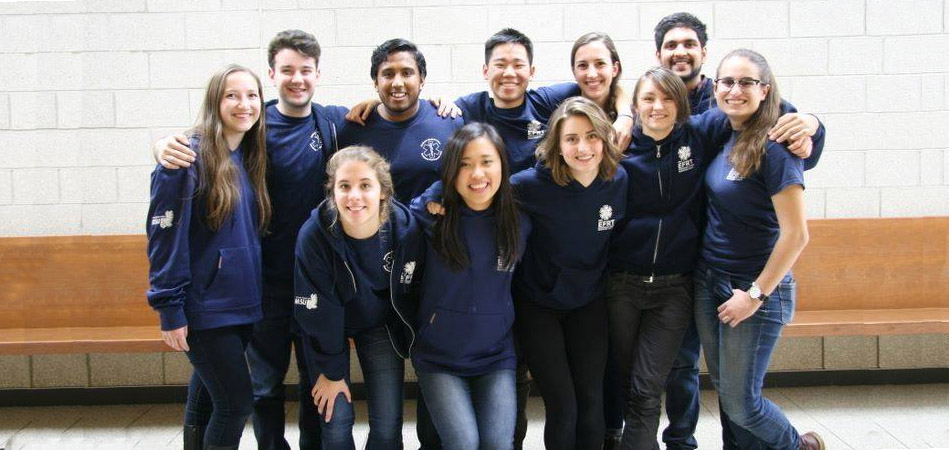EFRT an incredibly rewarding experience

Andrea Rossos is enrolled in Level II honours molecular biology and genetics, in the Faculty of Science.
When I first joined the Emergency First Response Team (EFRT), I honestly had no idea what to expect. The extent of my knowledge of the team included only knowing what the acronym stood for, and occasionally seeing these people with huge yellow backpacks riding around campus. However, I decided to give tryouts a shot on a whim based only on the fact that I liked first aid.
Fast forward a couple of weeks and I was past the written application and interview process and was in a pool of forty-two candidates involved in a two-week intensive training process, where at the end we would be evaluated on responding to a variety of simulated situations around campus with a team of people we had never previously met. At the beginning of this process, I was nervous about responding to situations. I was previously a lifeguard and responding to practice situations were always my most dreaded part of training. As the first week of optional training nights went on, I went to every session.
At the start of the week, I went with the purpose of giving myself an advantage once evaluated situations rolled around, but I was surprised by how much I loved learning all of the new skills, and applying them in practice. I started looking forward to these practice nights, and they became one of the best parts of my day. One of the things that I wasn’t expecting about orientation, was that there was never a focus on tensoring or splinting or treating the common injuries EFRT sees. The emphasis was about learning how to approach every single situation whether it be a multi-person car accident, an person found unconscious or a mental health emergency. A popular question among candidates was ‘What if the patient appeared this way?’, or ‘What if this happened in the situation?’, among other hypotheticals. Often the instructors couldn’t answer because every situation is so unique you couldn’t possibly plan for every single one of them. At the time, these answers frustrated the candidates because we didn’t understand how we were expected to respond to every situation if we couldn’t plan out every possible outcome.
Fast forward to today, I have almost finished my first school year as an EFRT responder and I now know exactly what the responders were talking about at orientation. You can’t approach calls with a pre-planned map in your head of how it will go because every call and every patient are different. The only way to really be prepared is to practice extensively, and train and be comfortable in your approach and skills in order to be confident that you and your team have everything you need to deal with situations.
It is amazing to think that a few short months ago I barely knew what EFRT was, and now it has become such a daily and integral part of my life. In this time I have learned more than I thought possible about both responding and myself, and have had the chance to make friends and work with the remarkable people on the team. EFRT has been such an incredibly rewarding experience in so many ways, and I am beyond grateful that I was given the opportunity to be part of such a meaningful service.
Contact EFRT if you require medical assistance on campus by:
– Dialing “88” from any campus phone
– Directly calling a McMaster Security Dispatcher at 905-522-4135 on any cellphone
– Using the red emergency poles located around campus
If you would like to know more about joining EFRT, check out the recruitment process from last year, and if you want updates on next years recruitment please sign up for our recruitment email list.


